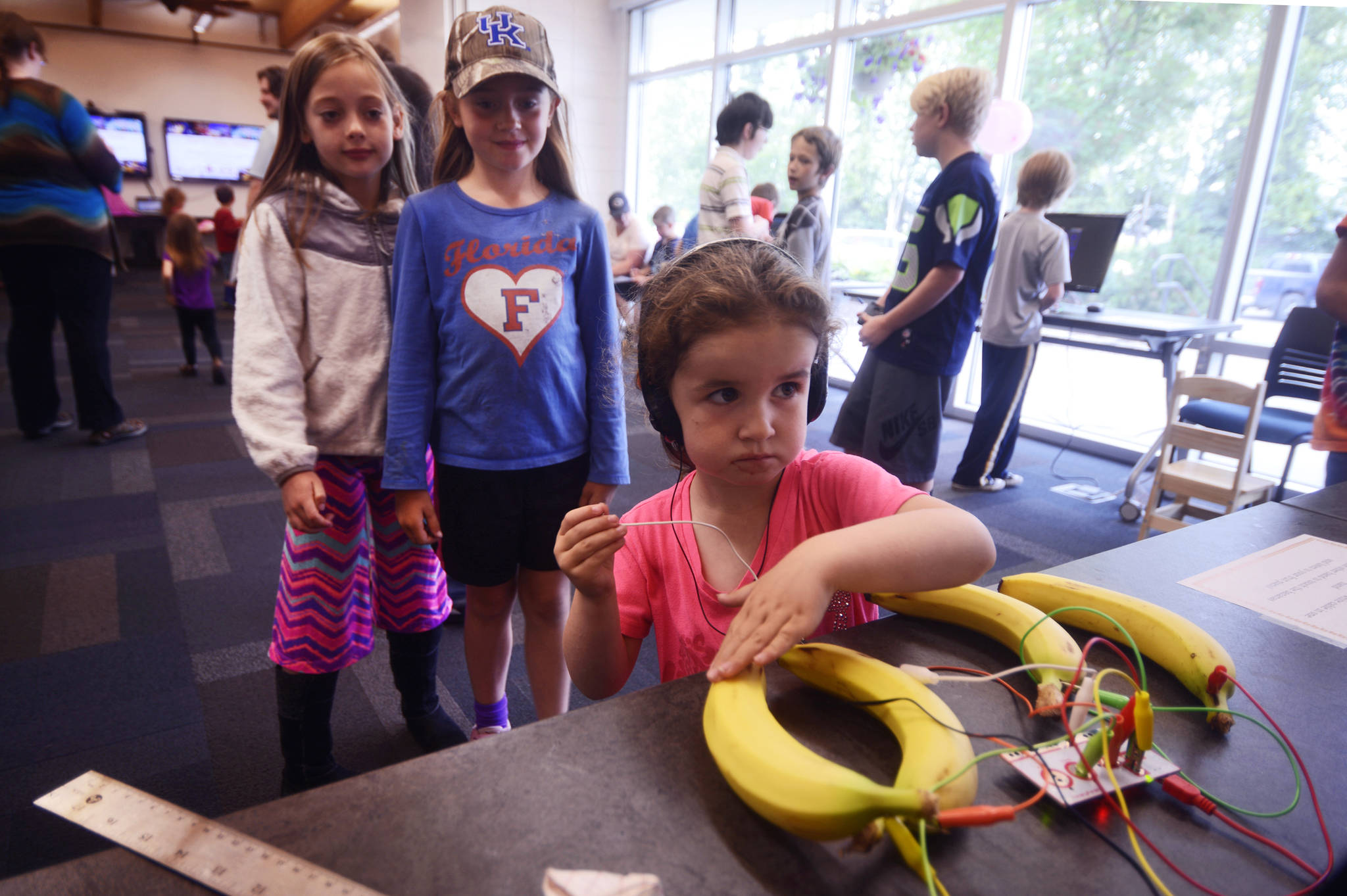In the world of consumer electronics, the Raspberry Pi is meant to be a project more than a product: a computer consisting of single programmable circuit board, built to be cheap and accessible to anyone of any age learning the basics of digital hardware and software. The Kenai Community Library has 12 Raspberry Pi units and is starting a new youth club dedicated to putting them to the most inventive use possible.
After Library Director Mary Jo Joiner learned about Raspberry Pi at a library conference, she thought that using the device in an education program at the library “sounded pretty doable.” The library purchased the miniature computer processors — housed in plastic cases about the size of a deck of cards — from the U.K-based educational nonprofit Raspberry Pi Foundation for $32 each with funds provided by the Friends of the Kenai Community Library.
The envisioned program, however, didn’t happen until recent Soldotna High School graduate Kianna Steadman began working at the library in its new summer internship position, funded with a grant from the American Library Association.
“We’ve never had the time to devote to just developing a program, so when this internship came up, it was kind of the perfect thing,” Joiner said. “You had to have a project, and (the Raspberry Pi club) was something we had on the back burner — the Friends had already agreed to fund it — so once we had somebody to put it together for us, it was really perfect.”
Steadman is currently signing up interested students for the club, kicking off with a Raspberry Pi demonstration at the Kenai Library on Monday.
Steadman hadn’t written computer code and hadn’t heard of Raspberry Pi before taking up the library internship. Of the possible applications, she said she’d been especially interested in Sonic Pi, a programing language made for synthesizing music, which takes scales, chords, and sound samples as objects. Steadman wrote three pieces with it and on Monday displayed their coding so students could tweak the variables of different sonic elements.
“I really love music, so when I heard they had Sonic Pi I was super excited about that,” Steadman said. “They have tutorials on it, so I just learned that and started creating music. I’m excited to share it with kids, because I think that’s also a great way to learn coding.”
The other coding language demonstrated Monday on the library’s Pi units was Scratch, a free coding language developed for children by the Massachusetts Institute of Technology’s Media Lab. On Monday, one of the library’s Pi units displayed a game in which the player guides a cartoon crab through a maze to reach a cookie. Alongside the maze was the underlying Scratch code, which represented commands as colored blocks that fit together like Legos, containing editable text fields and drop-down menus to choose variables.
“You can actually change the game — like, you can make the crab blue,” said William Smith, a homeschool student who plans to join the library’s Raspberry Pi club. “You can make the cookie really big, so it’s super-easy, or make it really tiny, so it’s hard.”
Smith said his family has a Raspberry Pi computer at home — he uses it to play a Pi version of Minecraft. In the club, he plans to do a project using Scratch, though he said he’s more interested in making videos and animations with it than games.
Some Raspberry Pi units were connected to the traditional computer interface of mouse and keyboard. Others took more unusual inputs. The library also has a new collection of Makey Makey units — a circuit board equipped with alligator clips that can make any electricity-conducting object into a switch to trigger program events. Monday’s Makey Makey demonstrations included a Scratch-coded PacMan game with Makey Makey-connected paper buttons, a game in which students linked hands to form a circuit that changed the outfit of an onscreen cartoon cat when they clapped, and the “Banana Piano,” in which wired bananas became keys in a digital keyboard.
Steadman will introduce any interested students to the nuts and bolts of making these and other projects in a three-day workshop from July 31 – Aug. 2. A fourth workshop on Aug. 4 will be dedicated to coding music with Sonic Pi. After that, she hopes the workshop participants will become leaders of the new Raspberry Pi club as they continue working on their own projects.
“We’re hoping with our workshop that those kids will come out as mentors, and then those kids will be able to teach new kids,” she said.
She also hopes local computer hobbyists doing their own Raspberry Pi projects will come aboard as adult mentors.
“We’re hoping to bring in guest speakers and members of the community, so anyone that has experience with this can volunteer to help the kids and teach different things, and also kind of make it an inventive playground, where we have all the technology out and the kids can make whatever with what they’ve learned,” Steadman said.
She’ll end her 10-week internship in the fall when she starts taking classes at Kenai Peninsula College, and will be looking for someone else to continue leading the club. Having started the project without any experience in computer science, Steadman said that learning to code with Raspberry Pi had interested her the same way she hopes it will interest students.
“As I’ve begun doing it, I’ve definitely become a lot more interested in programing and seeing how amazing it really is,” she said. “I might actually take a programming class in college.”

